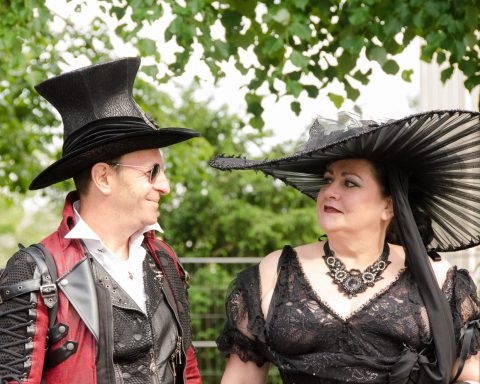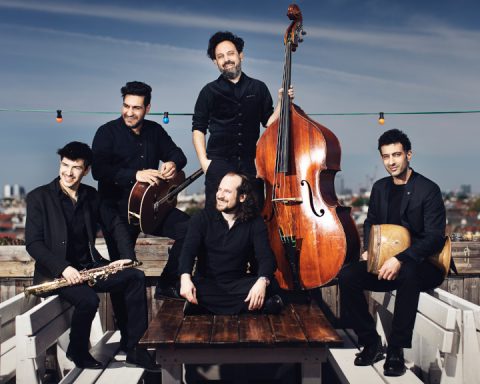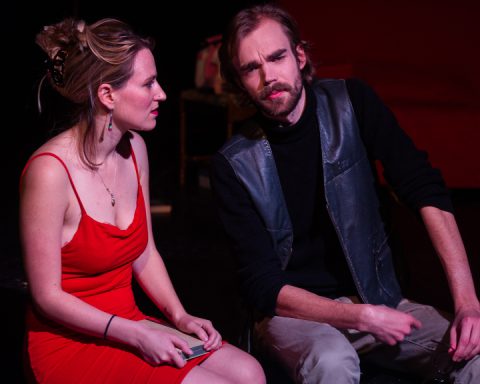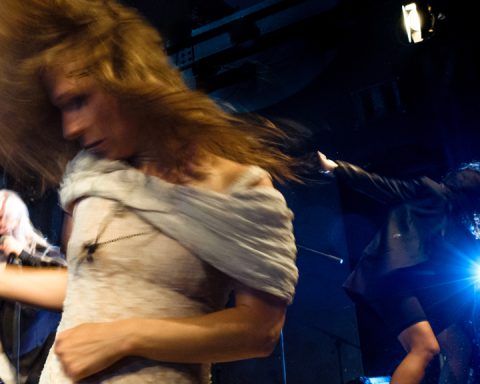Leipzig is a boom town if you migrated all the way here just to be a service operative at DHL. The hype is real if you receive arts funding, work in local construction, play professional football, or are raising children in a penthouse loft conversion anywhere near Eisenbahnstraße. Much has changed in this city since the old days.

The New Leipzig is “just trendy bullshit, it’s not forever, but this…” – a man of middle age with an admirable mohawk is explaining to me, and gesturing over his head at the venue behind him.
He and I are outside the Felsenkeller on Zschochersche Straße. I’ve just arrived on the scene to see the beautiful white Felsenkeller bulk teeming tonight with self-identifying punk fans like this guy, a slightly-interested warm-up vox pop, who is answering my questions while rolling a jay-bird on the stone steps out the front. There are a handful of other spiky black-clad lads hanging round in the freezing cold, waiting for the bird to light or the next band to play. Whichever happens first.
“…but this is real,” the guy tells me. “This has always been here.”
It’s left open whether he’s referring to the event we’re both attending tonight – the Voice of Oi! festival, now in its sixth year – or making a more general statement about Leipzig’s long-standing affinity with alternative rock culture.
Punk rock is very much an Old Leipzig thing.
Before there were reasons to be in Leipzig, punk rock was here in Leipzig. Before the jobs, and the international attention, and the investment. When the population was thinning through the ‘90s, punk rock concerts were happening here, and they still happen regularly at venues like Zoro. According to Punk Im Osten, there are 60 punk bands currently based in this city.
—
Alex?
Alex: I’m working. Maybe you could text me the questions.
What exactly is the difference between Oi! and punk?
Alex: Well, punk has a much wider demographic. Anything goes so long as you’re saying something new. Oi! is more regimented. There is Oi! music and Oi! clothes. Bands like Cockney Rejects, Blitz, and Runnin’ Riot.
—
The Voice of Oi! Festival in 2018 is nine bands over two days on the big stage at the Felsenkeller. The line up posters are black and red and read like a patchwork of no-context newspaper slogans. There are band names like Discipline, The Exploited, Hateful, Pöbel & Gesocks.
It’s now 6pm on the last day of the festival, the 3rd of March, and I’m waiting to get inside. The raised eyebrow behind the counter – wristband control – squints at the email exchange on my phone between myself and Toni Müller that appears to invite me in for free. He’s searching to find my name on a guestlist somewhere.

Toni has been among the leading Oi! fest curators this year, and I came down tonight to interview him about that experience. I get my wristband, and Raised Eyebrow asks me if I know what Toni looks like. I scoff, and tell Raised Eyebrow that I absolutely do, just in case not-knowing-what-Toni-Müller-looks-like would mean paying the €28 entry fee like everybody else.
It’s a stupid lie that I almost instantly regret.
You see, the Felsenkeller is a big venue. It’s not a sell-out tonight, but there are comfortably one thousand people inside this auditorium dressed predominantly in black clothes, and wearing predominantly very short hair – and Toni Müller could be any one of these people. There are no visible clues as to who Toni Müller could be. Nobody is holding a clipboard and looking important and directing journalists to their appropriate sources, and I don’t have any way of contacting the guy. I have an email.
I realise quickly that playing Where’s Wally with a room full of Joey Ramone clones isn’t getting me anywhere, and I have to find another way around. Maybe I should give Alex a call.
—
Did you ever have the opportunity to play in Leipzig before?
Alex: Yeah, back in the 90’s my old band Ex-Cathedra played in Zoro. It was this big, squatted castle-like building. It was awesome and the people were great. I was looking forward to playing Leipzig again with Hateful until the snow in Glasgow fucked that up.
—
My superficial impression wandering around this auditorium is that Oi! culture has a very distinct wardrobe consisting of two extremes. There are a few men here who have dressed up for the occasion, and they are wearing braces and trousers, or hooped T-shirts, skinned heads, skipped bunnets, stained denim with sewn-on Union Jack patches. Oi!’s roots are deep in 1970s London. Oi!’s fashion is tough and working-class. Oi! is macho like a spilt drink in a pool hall.
Some degree of counterpoint anti-variety is added by the other men, a comfortable majority, who are simply attending in generic dark clothing. From a distance, only the big fashionistas stand out in an anonymous wall of swarming cotton-rich black band tees. There are women here also, but not many.
There have been some last minute changes to the running order, which partially explains why nothing is really happening at all right now. The horror show currently playing out in Western Europe’s weather patterns has meant all flights out of Glasgow are grounded.

This means the Scottish band Hateful can no longer make it to the Voice of Oi!, and have had to pull out. They were due on stage round about now.
Instead, Dolly D, a punk band from Dresden, are soundchecking the stage. Two fans are waving at them from the barrier, and the singer, Mario, acknowledges both of them with a handshake that he has to bend awkwardly and go out of his way to meet. Most of the audience just hang back and wait for something to happen while the band warm up and tune.
Mario is wearing Adidas shorts on the coldest night of the year. The die-hards explain to me that this is kind of his trademark, but otherwise Dolly D could be any four men among the generic-darkly-dressed types in the room. Like all of these bands playing at this festival, and like most of the attendees, Dolly D are older and Dad-shaped. They have been playing shows together since 1993.
—
Now that you’re older, does playing in a punk band mean something different to you?
Alex: Obviously when punk was new and I was 40 years younger it appealed to the wild youth in me, but still today there’s that same buzz I get just thrashing out a barre chord in E with the amp up full. It’s a primal thing that doesn’t need analysis.
At what point did nostalgia become part of punk culture?
Alex: I suppose nostalgia creeped into punk the same way it happened with rock and roll and jazz and blues. Punk is definitely a part of the mainstream [now], and the older “Dad generation” can be seen at the back of gigs. Maybe it’s jealousy cos their time has passed.
—
The band finally begin to play. Mario goads the crowd. Without exaggeration, every line this man sings sounds like it was written with an exclamation mark.
There is an admirable Alice Cooper element to the performance aspect of getting and staying very angry for an hour – but if Dolly D are a fair reflection of what Oi! is, I’m left underwhelmed by the limitations of this genre.
However, there are a portion of the crowd who are really into it – and for €28, I suppose they have to be.
The mosh pit is populated by a bold 1 in 20. The older ones observe at a safe distance, standing beside other people like myself who are either more passive in their consumption of live music or reflecting on poor life choices that did not result in getting Toni Müller’s phone number.
“There was a Scottish band that was meant to play tonight,” the guy next to me says, when I tell him that I’m a journalist from Scotland and that I’m looking for a Mr Müller.
I confirm to this man that Scotland is a really small country, and that Hateful’s guitar player, Alex Aiken, is actually my upstairs neighbour from back home – and despite the band name, is quite a friendly guy.

—
Can you remember when you first got into punk?
Alex: I first got into punk when I was 14. It was 1977 and I was just going into 2nd year in high school. It blew my teenage mind and gave me a way of expressing my feelings of anger and excitement and confusion all wrapped up in a 3 minute song.
—
Back in Glasgow, not long after he moved in, I remember looking through Alex’s record collection. The guy had the history of punk archived in his vinyl shelves. Even rare and expensive LPs that I’d never physically seen before, like PiL’s Metal Box and some obscure Clash 12″s, pre-domination U2, and weird new-wave stuff that I’d not heard before or since.
That variety of influences is what made Alex’s own approach to the guitar interesting to me. He had a notable music career himself playing jaggy guitar lines in Ex-Cathedra, a ska band. I like punk music when it dares to be different, and I’m not the only one disappointed that Alex’s new band, Hateful, couldn’t make it to the Voice of Oi! tonight.
I would have liked to have experienced Oi! music that tries to be anything different to what Dolly D are giving me in this moment.
The most captivating performer tonight, in my opinion, is a messy drunk. Not only has this young guy gas-lighted the mosh pit by trying to pick a real fight, but he’s having so much fun antagonising everyone within proximity, that the fact he may or may not have overmedicated himself beyond the point of continence is surprisingly tolerated by his peers.
He notices that I’m watching him and taking notes, and it’s like this guy is so punk he can smell cerebral distance from twenty paces away. He investigates, the hard way, avoiding all staircases and literally climbing the wall to reach the raised level where I thought I was safe.
Boy now stands one inch from my face on the wrong side of the railing. He creases his expression to a frown and proceeds to sing along to Dolly D, and gives me this passionate phonetic imitation of a song he does not know. Boy’s breath smells septically alcoholic, but his hair is purple and his arms are skinny. I really don’t feel threatened, but at the same time I can’t find a suitable reaction with which to respond.
See, I recognise that what Boy is doing is beautiful. He’s trying to include me. Boy wants me to react with the same energy he’s showing me – but when I don’t give him that energy back, and just stand there looking at him in neutral, his enthusiasm starves and he gets confused, looks at me like I’m in some way broken.

I tell him I’m a journalist from Scotland, but he doesn’t care. He doesn’t want to do an interview. He wants my scarf, and I let him take it back to the mosh pit, where he waves it around like a tartan flag. I know I’ll get it back again when the music stops.
—
Did you ever speak with Toni Müller?
Alex: No. Most of the organising is done by [the other guys].
Ah, it’s fine. I think it’s going to be alright.
—
It’s difficult to explain why Oi! music works for people like Boy, in much the same way that it’s difficult to beat young children at boardgames. In Dolly D’s set, every song has a straight rock beat. Every guitar chord is strummed with the subtlety of ham-fists. Bass guitar disobeys common laws of funk and groove, and is used as a tool to simply make even more noise in even more frequencies.
This Oi! is not music that is technically impressive, well-composed, or even that interesting on its own, but at the very least you know what’s going to happen next.
Even to the point of parody, and then beyond parody – to the point of having Wuu-ohh-Wuu-ohh-shaped gang vocals on all choruses. It’s not surprising at all that Dolly D’s most famous songs caught on as Dynamo Dresden football chants, because their objective is the widest possible accessibility. Someone that doesn’t even like music could sing along to songs like this by the second refrain.
However, to suggest that Oi! is nothing clever would be stating an obvious intention. Any genre of music named after a one-syllable grunt is not trying to be clever. The objective of Oi! is purely visceral, to be a soundtrack to a pressure release. The soundtrack to a basic form of anger that was in English football stadiums when Oi! was born, and remained in that country through the industrial decline of the ‘80s.
That same anger was felt here in Leipzig through this city’s own decline in the ‘90s – but now look how times have changed, and look at how many Oi! fans can afford to spend €28 on leisure expenses.
I don’t think I’m wrong in saying that Leipzig is no longer the natural home for Oi! in the way that it once may have been. However, occasions like these serve a nostalgic function for the people and the bands and the kind of Leipzig that existed in yesteryears gone by.









